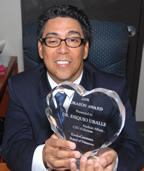Associate Dean of Students Honored
Esiquio Uballe Recognized for Leadership, Advancing Academic Achievement
March 3, 2008
By Debra Cano Ramos
Despite his poor and humble upbringing in a family of migrant farm workers, Esiquio Uballe stayed in school at the insistence of his mother, who had no formal education. The youngest of 11 children, Uballe was the first in his family to earn a college degree, eventually earning a doctorate so he could help other young Latinos achieve academic success.
“The education I received served to further empower me and prepare me for a future career where I could one day make a difference,” said Uballe, associate dean of students for student life programs and services.
“The fact that my mother encouraged me to stay in school speaks volumes when I have often heard insensitive educators say that Latino parents neither care that their children get an education nor encourage their children to attend school.”
For his longtime leadership to promote academic achievement among young students, Uballe was honored last month with KinderCaminata’s Corazon Award.
KinderCaminata is an Orange County nonprofit community organization that provides outreach to kindergarteners and their families to guide them on a path to one day realize a college education.
“I am truly humbled and honored to receive this acknowledgement from community members, colleagues and peers for the work I love to do. It is very heartwarming. I feel elated,” said Uballe, who holds a doctorate in educational leadership and policy studies. “It also validates the efforts that I have made, and motivates me to continue to be engaged in promoting higher education especially to economically and educationally disadvantaged students.”
Last year, CSUF President Milton A. Gordon was the recipient of the award for his leadership and support of Latinos in higher education.
Uballe was selected because he is a “role model who has made a difference” in the lives of Latino students, said Juan Carlos Araque, KinderCaminata board president.
“He’s a champion for the Hispanic community in embracing the mission of KinderCaminata,” Araque said. “He and his team do a wonderful job of making sure that more kids reach the university level, stay and complete their studies. He is being honored not only for his work at the university, but for his work in the community with children and their families.”
The Corazon Award is the highest recognition the organization gives to an individual, Araque said. The organization’s message to students is: Si, se puede! (“Yes, you can!”) Through KinderCaminata, disadvantaged children from local school districts visit area college campuses each March, near the March 31 birthday of civil rights leader Cesar Chavez.
The hope is that these students, many from immigrant and low-income families, will develop aspirations to set their sights on attending college, Uballe said.
“One of the factors and challenges that exist among first-generation college students is the lack of familiarity that their families have about college enrollment. By exposing students to college at a young age and presenting it as an option can go a long way to making it a reality,” Uballe said. “It is about creating hope. I have many years of experience in higher education, and for a lot of those years, I worked in programs or positions motivating students and assisting students to enroll in college.”
Uballe, who grew up in Austin, Texas, was active in the Chicano movement early in his career. He joined Cal State Fullerton five years ago and was hired as assistant to the vice president for student affairs. After a year, he transitioned to his current position and is responsible for supervising the Student Organization Resource and Volunteer & Service centers.
“I enjoy working at Cal State Fullerton, especially because of the diversity. Cal State Fullerton is a great example of what it truly means to be a Hispanic Serving Institution. As an administrator, I am committed to helping all students, but I’m happy that I also can engage in special efforts to assist with the Hispanic student population.”

